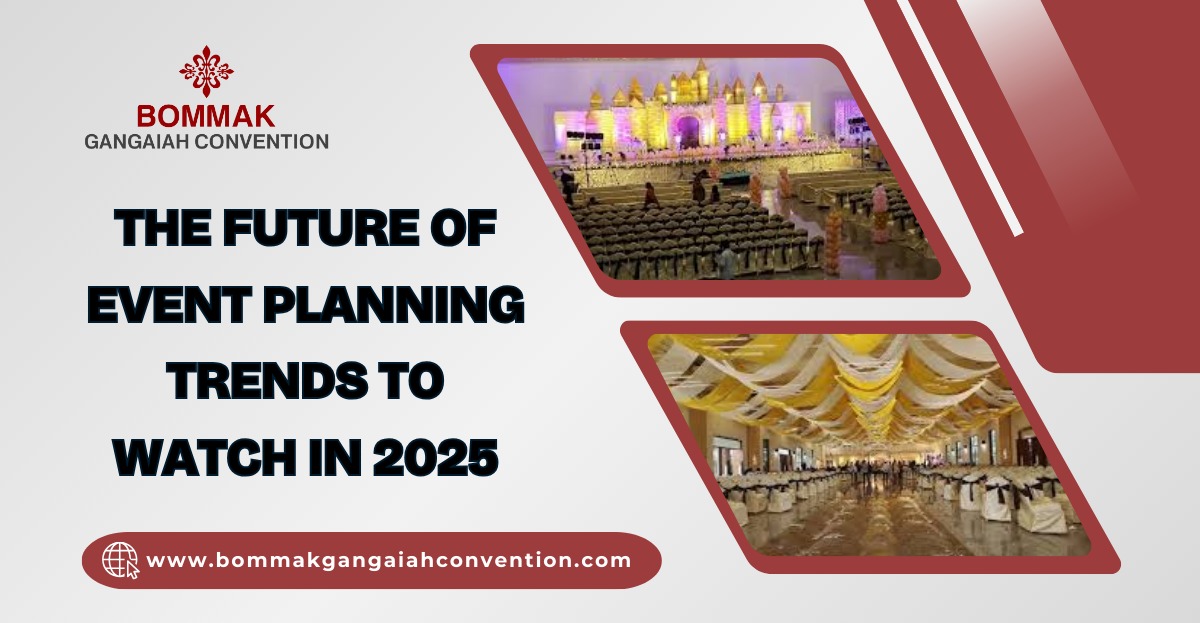Event planning has evolved significantly over the past decade, transitioning from traditional in-person gatherings to a dynamic mix of virtual and hybrid experiences. As we move into 2025, the industry is poised for even more innovation, reshaping how we organize, execute, and experience events.
Whether you’re planning a corporate conference, wedding, or large-scale festival, staying updated with these trends will help you create unforgettable and impactful events. Let’s explore the most significant trends shaping the future of event planning in 2025.
1. Hybrid Events: The New Industry Standard
Why Hybrid Events Are Here to Stay
Hybrid events, which seamlessly blend in-person and virtual components, have become a cornerstone of modern event planning. With advanced streaming technology, Virtual Reality (VR), and Augmented Reality (AR), hybrid events will offer immersive experiences, allowing attendees to participate from anywhere in the world.
- Increased accessibility for global audiences
- Enhanced engagement with interactive features like 3D networking
- Cost-effective and flexible for organizers and attendees
Expect innovations like virtual trade shows, real-time digital networking, and AI-driven matchmaking to redefine the hybrid event experience.
2. Sustainability: Eco-Friendly Event Planning
Green Event Practices
Sustainability is becoming a core focus in event management. In 2025, eco-conscious practices will be essential for both corporate and social events. Event planners will adopt:
- Sustainable venues using renewable energy sources
- Zero-waste strategies with biodegradable materials and digital programs
- Eco-friendly catering featuring locally sourced organic food
- Carbon footprint tracking tools for reducing emissions
By prioritizing sustainability, events will not only reduce their environmental impact but also enhance brand reputation and attract eco-conscious attendees.
3. Personalization & Attendee Experience
Tailored Experiences Through Technology
Event attendees now expect personalized experiences tailored to their preferences. With AI and data analytics, event planners can provide:
- Customized event agendas
- AI-driven networking recommendations
- Personalized content and session suggestions
Attendees will enjoy hyper-personalized experiences that make events more engaging and memorable.
4. Immersive Technologies: VR, AR, and AI
Virtual & Augmented Reality Enhancements
Technology is set to revolutionize event experiences with:
- VR-powered virtual attendance for remote participants
- AR overlays providing interactive content at physical venues
- AI-driven chatbots for instant attendee support
These innovations will redefine how people interact with event content, making engagement more dynamic and interactive.
5. Wellness-Focused Event Planning
Health & Well-Being in Events
As wellness gains importance, event planners will integrate elements promoting mental and physical well-being:
- Wellness lounges for relaxation
- Guided meditation and mindfulness sessions
- Health-conscious catering with vegan and gluten-free options
By prioritizing attendee well-being, events will become more inclusive and enjoyable.
6. Social Media & Live Engagement
Integrated Social Media Strategies
Social media will play a crucial role in event promotion and engagement, with trends including:
- Live social media walls displaying attendee interactions
- Hashtag campaigns to increase event visibility
- Livestreaming and on-demand content for broader reach
Event planners will leverage social media to enhance real-time audience engagement and extend the event’s impact.
7. Data-Driven Event Planning
Analytics & Real-Time Insights
Event planners will rely on data analytics for optimizing event success. Key advancements include:
- Real-time attendee tracking for engagement insights
- Predictive analytics to refine event strategies
- AI-powered post-event feedback analysis
Data-driven decision-making will help create more impactful and successful events.
8. The Rise of Micro-Events
Exclusive & Intimate Gatherings
Micro-events—small, niche gatherings—will grow in popularity due to their ability to foster meaningful connections. Benefits include:
- Higher engagement with targeted audiences
- More personalized and interactive experiences
- Cost-effective planning with high ROI
Businesses and brands will increasingly focus on these intimate, high-value events.
Conclusion: The Future of Event Planning is Bright
The event industry is on the verge of a transformative shift in 2025, driven by technology, sustainability, and personalization. By embracing these trends—hybrid formats, immersive technologies, data analytics, and eco-friendly practices—event planners can create memorable, impactful, and future-ready events.
As we step into this new era, staying ahead of trends will be the key to success. Whether you’re planning a wedding, corporate seminar, or festival, integrating these innovations will ensure your event stands out and resonates with your audience.
Are You Ready for the Future of Events?
Start implementing these trends today and revolutionize the way you plan and execute your events in 2025!



